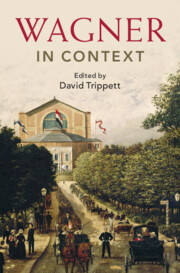Book contents
- Wagner in Context
- Composers in Context
- Wagner in Context
- Copyright page
- Contents
- Illustrations
- Musical Examples
- Contributors
- Acknowledgements
- Abbreviations
- Introduction
- I Place
- II People
- III Politics, Ideas, and Bodies
- IV Life, Language, and the Ancient World
- Chapter 23 Wagner’s Finances
- Chapter 24 Wagner’s Apprenticeship
- Chapter 25 Wagner’s Mendacious Humanism: Wagnerian Rhetoric between Nature and the Human
- Chapter 26 Declaiming Wagner: Between Genesis and Historical Performance Practice
- Chapter 27 The German Study of India and Buddhism
- Chapter 28 Greek Drama in Its Nineteenth-Century Reception
- V Music and Performance
- VI Reception
- Further Reading
- Select Bibliography
- Index
Chapter 24 - Wagner’s Apprenticeship
from IV - Life, Language, and the Ancient World
Published online by Cambridge University Press: 14 March 2024
- Wagner in Context
- Composers in Context
- Wagner in Context
- Copyright page
- Contents
- Illustrations
- Musical Examples
- Contributors
- Acknowledgements
- Abbreviations
- Introduction
- I Place
- II People
- III Politics, Ideas, and Bodies
- IV Life, Language, and the Ancient World
- Chapter 23 Wagner’s Finances
- Chapter 24 Wagner’s Apprenticeship
- Chapter 25 Wagner’s Mendacious Humanism: Wagnerian Rhetoric between Nature and the Human
- Chapter 26 Declaiming Wagner: Between Genesis and Historical Performance Practice
- Chapter 27 The German Study of India and Buddhism
- Chapter 28 Greek Drama in Its Nineteenth-Century Reception
- V Music and Performance
- VI Reception
- Further Reading
- Select Bibliography
- Index
Summary
Wagner’s early compositional training is seldom examined, perhaps because of his unambiguous claim in 1851 to be an autodidact, taught only by ‘life, art and myself’. Yet Wagner’s work with Christian Müller and particularly with Theodor Weilig on early works and in abstract skills (notably counterpoint) reveal various dependencies. Wanger’s shifting attitude towards this period of training sits alongside his choice of more public mentors, in Beethoven and Weber, whose works he studied and arranged.
- Type
- Chapter
- Information
- Wagner in Context , pp. 239 - 248Publisher: Cambridge University PressPrint publication year: 2024

